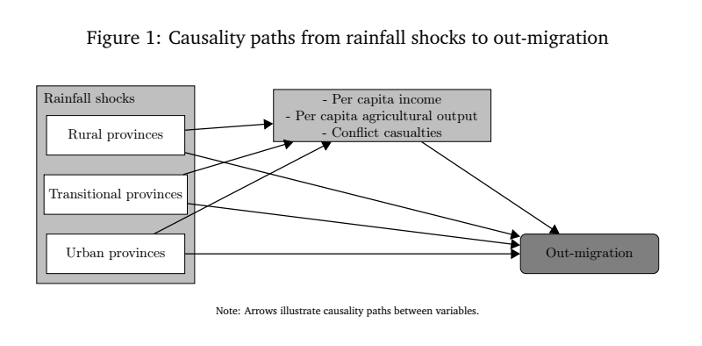CEEPR Working Paper
2023-08, March 2023
Nathan Delacrétaz, Bruno Lanz, Amir H. Delju, Étienne Piguet, Martine Rebetez
Migration decisions are increasingly studied as an adaptation response to climate change and empirical evidence is important to quantify its relevance for policy decisions. Building on farm-level studies documenting the role of extreme weather events as a key detrimental determinant of agricultural yields (e.g., Schlenker and Roberts, 2009; Burke and Lobell, 2010), the objective of our work is to understand how random deviations from long-run precipitation patterns act as a push factor in migration decisions in societies with a predominantly rural population.
Our work contributes to research trying to identify the mechanisms linking climate shocks and migration, and we focus on three channels through which rainfall shocks affect out-migration. First, per capita GDP captures economy-wide impacts that ripple local economic activities, including (but not limited to) agriculture, and ultimately affect populations living in rural regions. Second, agricultural GDP per capita may be directly affected by climate shock through agricultural yields, thereby acting as a push-factor, but it may also induce a poverty trap which prevents populations from migrating (Cattaneo and Peri, 2016). Lastly, we document how rainfall shocks affect local conflicts, which in turn may affect the extent of migration out of a given province. Figure 1 illustrates how we decompose the direct effect of rainfall shocks on out-migration across various channels.

To document these effects, we exploit 2008-2018 provincial-level data for Türkiye, a middle-income country with a large share of predominantly rural regions. We characterize the extent to which yearly rainfall deviates from a long-run local distribution of precipitation by a standardized precipitation index (SPI), allowing us to control for differences in long-run distribution of rainfall across space. We further exploit the longitudinal dimension of the data to introduce fixed effects in the analysis and control for the fact that rural regions tend to experience higher out-migration on average and account for temporal trends in rural to urban migration.
Our results show that years subject to below-average SPI (drought) imply higher out-migration from rural areas. Quantitatively, a negative SPI shock of one standard deviation in the long-run distribution of rural provinces is associated with a 3 percent increase in yearly migration out of rural provinces. We then show that negative SPI shocks imply a reduction of economy-wide output in rural areas, which in turn acts as a push factor triggering out-migration. This corresponds to around 26% of the direct effect of SPI shocks on out-migration in rural province.
By contrast, we do not find significant evidence that per capita agricultural GDP is a channel at the average of the sample. In fact, our data suggest that the agricultural GDP is only a relevant channel for provinces that are in the upper quartile of crop production. Importantly, while the agricultural channel plays a role through crop production, it is only relevant for a small share of provinces that rely heavily on these crops, rather than for rural provinces in general.
Lastly, we show that the number of conflict fatalities in rural regions tends to increase with droughts, and that conflicts act as a push factor. In rural provinces, around 8% of the total effect of SPI shocks on out-migration can be attributed to conflicts. This suggests that a “conflict channel” operates in parallel to the direct effect of SPI shocks on out-migration and hinges upon contextual and institutional factors (Abel et al., 2019).
One interpretation of our results is that provinces with low level of urbanization are more exposed to climate variability, making it more likely that precipitation shocks will act as a push factor in migration decisions. However, we emphasize that the mechanism that links droughts and migration in rural areas is more complex than a simple impact on the agricultural sector. One possible explanation is that price fluctuations for crops can impact other sectors of the local economy. In turn, for provinces with relatively high crop production and where the agricultural sector constitutes a larger share of the local economy, agricultural GDP is more directly affected by fluctuations in the SPI. Further research is needed to confirm this interpretation.
Furthermore, our analysis shows that conflicts also increase with droughts and play a role as a push factor in out-migration decisions, which is consistent with evidence from other contexts (Kelley et al., 2015; Missirian and Schlenker, 2017; Schutte et al., 2021; Eklund et al., 2022). This suggests that droughts give rise to separate channels through per capita GDP and conflicts. Taken together, more frequent droughts can be expected to increase out-migration in rural areas, both by affecting economy-wide activities and through conflicts. Making local economies more resilient to rainfall shocks, through local adaptation strategies or economic transfers, might help mitigate the impact of increased rainfall variability expected with future climate change.
We close by emphasizing that our data have not allowed us to document destination choices in relation to rural out-migration. Whether out-migration from rural provinces hasten urbanization, lead to rural-rural displacements, or induce international displacements, remains an open question.







